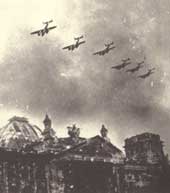|
|
| Berlin, April 30, 1945 |
On the Natural History of Destruction
By W.G. Sebald, Random House,
$ 19.50
The moment seems just right to review the posthumous book of essays by Sebald. It is apt because the book is about destruction. It is also posthumous. This is fitting since many of the values and sensibilities that Sebald espoused in this and his other books are now either dead or rendered irrelevant. Moreover, the predominant mood conveyed by Sebald’s themes and his style is melancholy, which is also the mood of the intellectual times we inhabit. There is so little happening around us to make us feel happy and to remind us of our own humanity.
Sebald takes his title from Solly Zuckerman, the scientific advisor to Churchill. After viewing the ravaged city of Cologne after World War II, Zuckerman agreed to write a report for Cyril Connolly to be entitled “On the natural history of destruction.” Nothing came of the project because the impact of the devastation was too overwhelming. “My first view of Cologne,” Zuckerman was to write in his autobiography, “cried out for a more eloquent piece than I could have written.’’ Many decades later, Sebald fulfilled Zuckerman’s post-war project. And in one of those ironic coincidences in which history abounds, it has come to be published in another era of destruction.
The principal essay in the book focuses on the destruction of German cities by Allied bombing in the second war. Sebald’s argument is that this traumatic event has never been adequately reflected upon in German writing, fiction and non-fiction. The Germans chose to anaesthetize themselves to the horror. “The need to know,” Sebald notes with great perspicacity, “was at odds to close down the senses.” Sebald argues and demonstrates that the majority of the available sources for the destruction of the German cities — and the sources are dispersed, varied and fragmentary — “are notable for a curious blindness to experience, the result of extremely narrow, biased and skewered perspectives.”
There is no attempt on Sebald’s part to deny the fact that the Germans brought upon themselves the complete annihilation of all their major cities. Also just as Dresden was destroyed so was Coventry; just as thousands of civilians lost their lives when the Allied bombers took over the German sky, 43,000 died in the London Blitz. The statistics Sebald marshals about the destruction of war are staggering: 600,000 German civilians fell victim to the Allied air-raids; three and a half million homes were destroyed; at the end of the war half a million people were homeless; there were 31.1 cubic metres of rubble for every person in Cologne and 42.8 cubic metres for every inhabitant of Dresden. Yet Sebald laments, “It seems to have left scarcely a trace of pain behind in the collective consciousness, it has been largely obliterated from the retrospective understanding of those affected.” There was no “literature of the ruins” in Germany.
Was this because post-war Germany, as a nation, looked only to the future? Or was it because, as Sebald suggests, those who saw the flames engulf the cities were incapable of comprehending the reality they saw and experienced? When they wrote about it they could not move beyond a few clichés. Violence and pain are not easy to describe within the conventions of the language and the vocabulary that we use. The air war over Germany, like the one over Iraq, was pure and undisguised. And human kind, in the memorable words of the modern poet, cannot bear too much reality.
Sebald closes his review of destruction by evoking Walter Benjamin’s angel of history. The angel’s face is turned towards the past in which he perceives not a chain of events but one single catastrophe which keeps piling wreckage upon wreckage. “The angel,” Benjamin wrote, “would like to stay, awaken the dead, make whole what has been smashed. But a storm is blowing from Paradise; it has got caught in his wings with such violence that the angel can no longer close them. This storm irresistibly propels him into the future to which his back is turned, while the pile of debris before him grows skyward. This storm is what we call progress.”
Is Time then never on the side of humanity?











